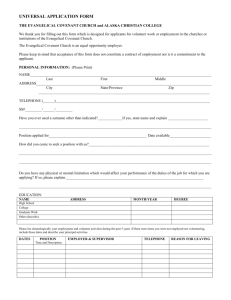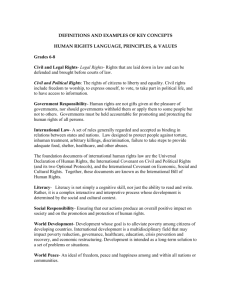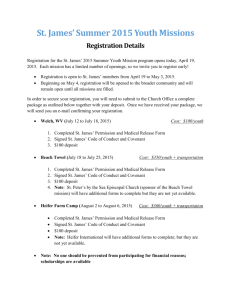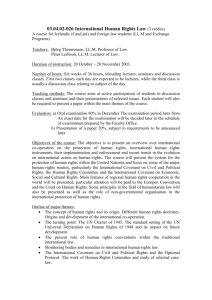Document 10465080
advertisement
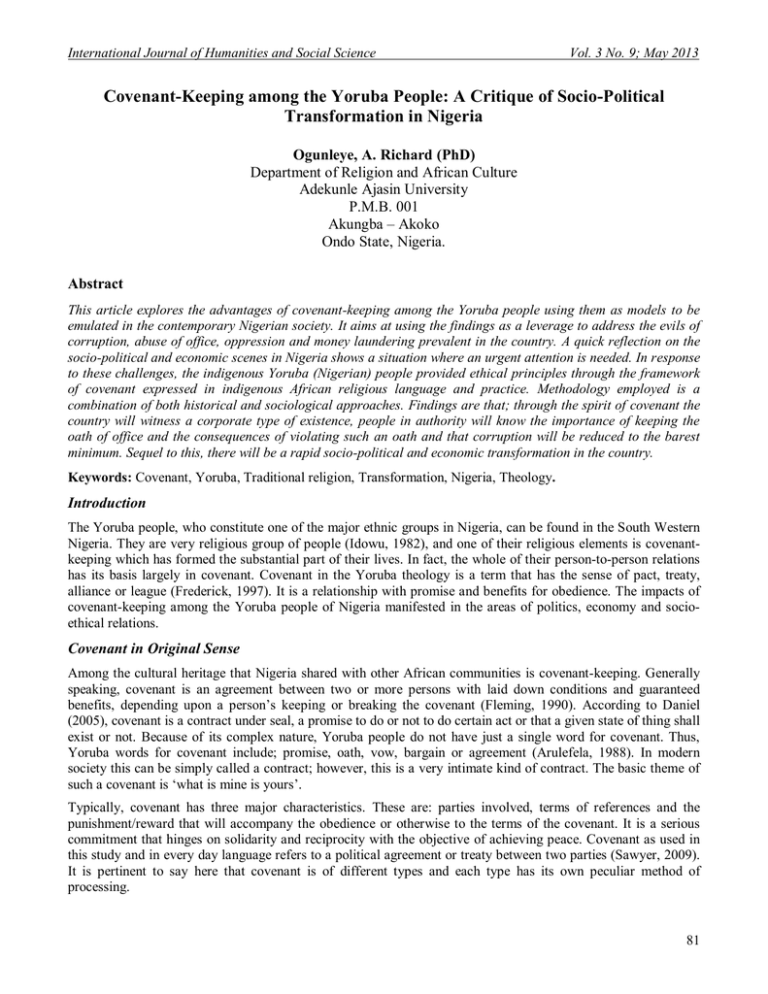
International Journal of Humanities and Social Science Vol. 3 No. 9; May 2013 Covenant-Keeping among the Yoruba People: A Critique of Socio-Political Transformation in Nigeria Ogunleye, A. Richard (PhD) Department of Religion and African Culture Adekunle Ajasin University P.M.B. 001 Akungba – Akoko Ondo State, Nigeria. Abstract This article explores the advantages of covenant-keeping among the Yoruba people using them as models to be emulated in the contemporary Nigerian society. It aims at using the findings as a leverage to address the evils of corruption, abuse of office, oppression and money laundering prevalent in the country. A quick reflection on the socio-political and economic scenes in Nigeria shows a situation where an urgent attention is needed. In response to these challenges, the indigenous Yoruba (Nigerian) people provided ethical principles through the framework of covenant expressed in indigenous African religious language and practice. Methodology employed is a combination of both historical and sociological approaches. Findings are that; through the spirit of covenant the country will witness a corporate type of existence, people in authority will know the importance of keeping the oath of office and the consequences of violating such an oath and that corruption will be reduced to the barest minimum. Sequel to this, there will be a rapid socio-political and economic transformation in the country. Keywords: Covenant, Yoruba, Traditional religion, Transformation, Nigeria, Theology. Introduction The Yoruba people, who constitute one of the major ethnic groups in Nigeria, can be found in the South Western Nigeria. They are very religious group of people (Idowu, 1982), and one of their religious elements is covenantkeeping which has formed the substantial part of their lives. In fact, the whole of their person-to-person relations has its basis largely in covenant. Covenant in the Yoruba theology is a term that has the sense of pact, treaty, alliance or league (Frederick, 1997). It is a relationship with promise and benefits for obedience. The impacts of covenant-keeping among the Yoruba people of Nigeria manifested in the areas of politics, economy and socioethical relations. Covenant in Original Sense Among the cultural heritage that Nigeria shared with other African communities is covenant-keeping. Generally speaking, covenant is an agreement between two or more persons with laid down conditions and guaranteed benefits, depending upon a person’s keeping or breaking the covenant (Fleming, 1990). According to Daniel (2005), covenant is a contract under seal, a promise to do or not to do certain act or that a given state of thing shall exist or not. Because of its complex nature, Yoruba people do not have just a single word for covenant. Thus, Yoruba words for covenant include; promise, oath, vow, bargain or agreement (Arulefela, 1988). In modern society this can be simply called a contract; however, this is a very intimate kind of contract. The basic theme of such a covenant is ‘what is mine is yours’. Typically, covenant has three major characteristics. These are: parties involved, terms of references and the punishment/reward that will accompany the obedience or otherwise to the terms of the covenant. It is a serious commitment that hinges on solidarity and reciprocity with the objective of achieving peace. Covenant as used in this study and in every day language refers to a political agreement or treaty between two parties (Sawyer, 2009). It is pertinent to say here that covenant is of different types and each type has its own peculiar method of processing. 81 © Center for Promoting Ideas, USA www.ijhssnet.com Covenant-Keeping in Yoruba (Nigerian) Traditional Setting By the doctrine of the African Traditional Religions, man is expected to be in covenant relationship with his fellow man and his object of worship. The implication of this is that any harm done to one member affects other members. Thus, it becomes necessary for the members of a cultic or religious group to seek for the well-being of one another and avoid any action that amounts to the breaking of covenant. With this in mind, the Yoruba people often handled the phenomenon of covenant with utmost care in order to move the society forward. Another point of interest in covenant-keeping is the corporate type of existence resulting from it. Covenant binds people together, thus, a member does not live his life alone. He is a member of the corporate body. Life and prosperity belong to all and are shared together. When a member is in sorrow others share it with him. Likewise, when one rejoices, other shares the joy with him. Material things are owned and shared together, punishment too are share together corporately in form of feeling of pain or sympathy (Abioye, 1986). Covenant therefore enhances oneness and helps to rid society of evil since an evil done to a member will surely affect others. In addition, covenant prevents unfaithfulness in the Yoruba traditional society. A covenant made in form of oath, taking either in front of divinity or religious emblems makes Yoruba people to comport themselves well in the society. A newly enthroned king who swears to deliver justice without fear or favor is duty bound to keep it. Anything contrary to the oath leads to disaster. Covenant therefore gives meaning and cohesion to society and enhances the sense of seeking for the good of others and the community in which he lives in its totality. There are different types and levels of covenant among the Yoruba people. We shall look at a few of those most commonly exist among them. These include; covenant between friends, husband and wife, king and his chiefs and between man and divinity. Covenant between friends can be in form of an ordinary spoken agreement between two friends. This type of covenant is often sealed with sharing of kola nut. Among the Yoruba, it is a taboo to share kola nut with a person and then speak ill of him or her. Kola nut is an important fruit in the Yoruba spiritual life. It is believed to be capable of warding off death, diseases and even pestilence. If two or more friends shared a piece of kola nut, the act becomes a covenant. Anybody therefore, who betrays the term of covenant is surely attracting evil on his/her head. Secondly, there is covenant between husband and wife. Once a woman is married to a man, she becomes one with him. In order to retain their marriage agreement, both the wife and her husband will enter into a covenant. According to Arulefela (1988), this type of covenant is often made in secret without the knowledge of their extended family. To go about this, the man would incise his body (usually left arm) and the woman would do the same. They would each rub a piece of kola nut in each others’ blood and eat it. After this, they must not betray each other. Another type of covenant is the one between kings and their chiefs. Kings among the Yoruba did not rule their kingdoms alone. They did so together with the council of chiefs. In order to be sure of their absolute loyalty, kings of various domains often enter into a covenant with their chiefs, at least once in a year. What usually takes place at Ile-Ife (the cradle of Yoruba race) during Olojo (a festival in honour of Ogun-the Yoruba god of iron) shows the covenant relationship that exists between kings and their chiefs in Yoruba land. During the festival, precisely on the fourth day, the king, who is the chief celebrant will lead a long procession of traditional chiefs to the Ogun Shrine. At the shrine, all chiefs would bring out their swords of office and the Ogun priest will mark them with chalk and canwood powder. After this, the entire chiefs will enter into a covenant of absolute loyalty with the king. It is this covenant-making that will mark the end of the fourth day of the celebration (Ogunleye, 2008). Besides, there is a covenant between man and divinity. Unlike the biblical covenant where it was God that entered into covenant with his people, in the Yoruba Traditional Religion, reverse is the case. The initiative is usually from the people and divinities were only called upon as witnesses. Failure to keep such covenant usually results to death of the offender. This type of covenant is very much like the one described by John Ruganda (1973) in his book titled: Covenant with Death in which he showed that a man’s word is his bond once he entered into a covenant with a divinity. Entering into a covenant relationship with certain divinity is often precipitated by one pressing issue or the other. It must be noted here that, once one is in covenant relationship with certain divinity, the person must be ready to fulfill his own part of the pact. This is because any covenant with a divinity in Yoruba land cannot be altered. 82 International Journal of Humanities and Social Science Vol. 3 No. 9; May 2013 Covenant-keeping and Oath of Office/Allegiance in Nigerian Context The prominent indigenous way of swearing to an oath of office and that of allegiance in Nigerian traditional setting is the entering into a covenant by both the leaders and followers. The purpose of this is to enhance good and adequate socio-political and ethical relations in the society. It is also to ensure that people who swear to such an oath keep tenaciously to its terms (Ayantayo, 1999). The religious concept of covenant was introduced into the Nigeria system of government in the form of oath of office which public officers have to swear in order to make them serve the public conscientiously. The oath of office, which can be administered by either a court or its delegate, involved pledging loyalty to perform faithfully the duties associated with the office. During this exercise, each person is allow to swear an oath of office with the religious paraphernalia or cultic symbol of the religion one belongs to. In the Nigerian context for example, adherents of traditional religion are allowed to swear to Ogun (god of iron) represented by a piece of metal while Christians and Muslims could swear with the Bible and the Quran respectively. The purpose for using these religious objects is that, as sacred objects, they were believed to have the potentials to instill fear in the people who swear by them. However, of all the leaders that have been taken oath of office, hardly can you see any one taking his oath of office in an indigenous way. They either take it in a Christian or Muslim way, knowing the nature of their God who will postpone judgment till judgment day while African gods are capable and known for instant justice. Thus, the oath taking as a mode of security and assuring conformity as it is presently practice in Nigeria, has neither been effective nor efficacious and therefore has failed. Among the traditional adherents in Nigeria, covenantbreaking or oath violation is abhorred because it is interpreted as a crime not only against human beings but also against the supernatural beings. Thus, before any king or ruler can be enthroned, he must pass through certain form of initiation and installation rites. During such rites, their pristine responsibilities, rights and privileges, checks and balances are strongly impressed upon them. After this they are to take the oaths of allegiance to the people and the sacred institutions of the community before the people will in turn take their oath of allegiance to them. It is to be noted here that, the oaths of allegiance taken by both the rulers and the ruled are directed to the sacred institutions of the community which no one can afford to violate the pledges without serious repercussions. It is for this very reason that oath-keeping is always taken seriously in social-political relations. At this juncture, one can say without mincing words that keeping to an oath or covenant is a religious obligation. It demands truthfulness which is a moral value upon which all forms of social, ethical and political relations are built. The point we are trying to bring out here is that, life is impossible without trust and that the growth of society is founded on unspoken natural trust. Thus, to swear falsely is a humiliation to God and to one’s own country. Apart from this, it is also contempt for the integrity and intelligence of people. There have been means for ensuring that these sanctions are upheld. Nobody is considered to be above such divine law and codes of conduct. Hence, misdemeanors of important persons in the Yoruba (Nigerian) traditional community such as kings and chiefs receive punitive measures (Nabofa, 1999). In case any king is becoming autocratic, members of such community can embark on demonstration and aggressive protest which can lead to the ousting of a king or any important person from his community. This is an act of maximum ejection of a privileged person from his status and role for wrongdoing. The recent removal of King Oluwadare Adesina from the throne on the 10th of June 2010 for gross misconduct and violation of his oath of office is a good example (The Nation, 2010). The ousted king was a traditional ruler of Akure-an ancient city in Ondo State of Nigeria. Socio-Political Situation of Nigeria in Recent Years In recent years, especially in this present political, social and economic dispensation, many people that were saddled with one responsibility or the other are performing below expectation. The reality on ground is that the people in authority, who are to act in such a way not only to abide by laws, but also to come by the approvals of those affected by their positional actions (Ahn, 2009) seem unable to enforce the highest degree of moral and religious truth demanded by this age. This no doubt, has caused a major set-back to the social development, political stability, cultural development and family integration. The importance attached to covenant, either in form of oath of allegiance or promises has been relegated to the background. Promises and oaths of office are broken at will, innocent and less privileged people are oppressed with impunity, justice is delayed and even denied and due processes of election into the position of authority are no longer followed. 83 © Center for Promoting Ideas, USA www.ijhssnet.com Not only these, right dealings in stock exchange transactions, economic policies, commercial ventures and political decisions are on the decline (Ehianu, 2005). The collapse of many banks and mortgage companies as a result of corruption and economic discrepancies led to financial crises in 2008 and 2009. There is a widespread perception in the general public that the business community has lost its moral compass and that greed is the overriding principles governing how business is done (Rae, 2009). This is not because such principles and ideals as justice and equity are not enshrined in the oaths of office they sworn to, but because many who were entrusted with authority have deviated from their oaths of allegiance. The rate at which covenant is being broken at will in this country has led to civil unrest, corruption, abuse of office, oppression and even moral decadence. It is this transgression of values in socio-political relations and attempt to finding a lasting solution to the problem that motivated this study. Relevance of Covenant-Keeping to the Socio-Political Transformation in Nigeria The importance of covenant to the socio-political upliftment of any given society cannot be over-emphasized. Covenant to a large extent influences behavior in a society. Man as social being is gregarious thus, living in physical and moral isolation is alien to his nature. Human beings everywhere want wholeness, solidarity and tenacity of purpose. In fact, this brings cohesion and harmony into the society. The sense of covenant safeguards the life of community and sets pattern of the code of behavior for the community as a whole. With the spirit of covenant in operation, couples will be able to keep their marital vow that will make such marriage a sustainable one (Ogunleye, 2008). This will reduced the rate at which home is been broken. Another area where covenant-keeping will be relevant to Nigerian social life is in the area of social justice. This refers to the economic welfare of special groups and as such demands a proportionate share of the social partners in the fruits of their economic cooperation. Social justice further demands a proportionate and equitable distribution of the wealth of a nation among different classes in society (Peschke, 1978). Hence, the concentration of a nation’s wealth in the hands of a few extremely rich families while the majority of citizens live in abject poverty is against the principle of social justice. For the purpose of the contemporary Nigerian society, what is needed is the full spirit of covenant. The oath of office taken by the people in authority must not be taken for granted. The last statement in the Nigerian’s oath of office ‘so help me God’ indicates (whether taking in Christian, Muslim or indigenous way) that God was invited as a witness to the oath taking ceremony. The implication of this is that, sooner or later, they will give account of their stewardship not only to the people but also to God. It is when the spirit behind the covenant is allowed to operate fully in our social and judicial system that there can be true justice and fair hearing. In the same vein, the issue of corruption which has been identified as the major obstacle to the growth, progress and development of Nigeria will not be able to raise its ugly head when the spirit behind the covenant-keeping is allowed to operate fully in Nigerian judicial system. New terminologies were invented to make odious expressions less repulsive. For examples, ‘settling’ or ‘settlement’ was substituted for bribery of the political class, ‘catchment area’ for tribalism, while ‘419’ is for high-tech stealing and organized fraud (Udo, 2005). Nevertheless, if the spirit of covenant is allow to operate, then, the social relation of man-to-man will be highly improved. Coming next is the relevance of covenant-keeping to the political transformation in Nigeria. Politics in Nigeria today is taking a new dimension and the country has been in search of suitable political ideology that would guarantee justice, peace, security, rapid economic growth and enduring democratic structures. In Nigeria today, the average politician exhibits three main characteristics, first, he sees himself as somebody above the law, secondly, to serve nobody but himself and thirdly, to make as much money as he can. “To him, the end justifies the means” (Adesina, 2005). These days, you never hear the voice of opposition provided that they are given their own share of billions at the expense of the poverty stricken masses. This idea, according to Elizabeth Amoah (2009), was borrowed from the westerners’ attitude of exploiting resources in Africa to enrich themselves. Cases of money laundering, corruption and electoral manipulation in various states of the country are still fresh in our memories (The Nation, 2006). We are all living witnesses of the destabilizing effects that corruption has fired into our collective national psyche. It boggles the mind and chills the blood that our generation has become nearly irredeemably deformed, morally debased, politically confused and economically crippled. 84 International Journal of Humanities and Social Science Vol. 3 No. 9; May 2013 However, hope is not lost, the above cankerworms can be eliminated or reduced to the barest minimum if the virtues of covenant-keeping which include; honesty, trustworthiness, truth and rectitude are observed in our sociopolitical, economic and ethical life. The point we are making here is that, Nigerian politicians and people in authority should abide by the terms of the oath of office and that of allegiance they sworn to before they assumed office. Also, politics of moral recklessness which characterizes the present political dispensations should be discouraged and stop forthwith. In this way, Nigeria will move forward in all ramifications. Conclusion This paper has sought to examine the importance of covenant-keeping among the Yoruba people with the aims of applying its virtues to the contemporary Nigerian society, to use the finding as a leverage to address the evils of corruption, abuse of office and money laundering that is prevalent in the country and lastly, to conscientize public officers so that they can realize the importance of their oaths of office and the consequences of breaking such oaths. A covenant breaker is considered not only worthless but also accursed. A person who is given to oath breaking or falsehood is believed not to be prospering in life. It is strongly believed among the Yoruba that, anybody who swear falsely or break an oath to which Ogun (The Yoruba god of iron) is a witness cannot escape severe judgment in a ghastly accident (Awolalu, 1979). Having examined the importance of covenant-keeping among the Yoruba people and its relevance to the contemporary Nigerian society, the paper therefore recommends that the spirit of covenant should be allowed to operate in our political, social, moral, religious and economic activities of the country-Nigeria. It is on this note that the paper concludes that, if the above recommendation is strictly adhere to then, the issue of moral decadence, abuse of office and money laundering that had eaten deep into the fabric of the country will be reduced to the barest minimum if not totally eradicated. More so, there will be rapid socio-political transformation since corruption will be drastically reduced and this will attracts foreign investors into the country. References Abioye, A. (1986). ‘Advanced Studies in West African Traditional Religion for Higher Schools.’ Oyo: NP. Adesina, S.O. (2005). ‘Prophet Amos and African Today.’ EPHA: Ekpoma Journal of Religious Studies. 6, 1&2. Ahn, I. (2009). Position and Responsibility: Jurgen Habermas, Reinhold Niebuhr and the Co-Reconstruction of the Positional Imperative. Eugene, Oregon: Pickwick Publications. Amoah, E. (2009). ‘African Traditional Religion and the Concept of Poverty’, Peter, J.P. (Ed). Religion and Poverty. London: Duke University Press. Arulefela, J.O. (1988). Covenant in the Old Testament and in Yoruba land . (Ibadan: Daystar Press). Awolalu J.O. (1979). Yoruba Belief and Sacrificial Rites. London: Longman). Ayantayo, J.K. (1999). ‘Religious Ethical issues in the Oath of Office in the Nigerian Constitution’, Orita: Ibadan Journal of Religious Studies. xxx1, 1&2. Daniel, J.E. Cited in Awoneye, A.B, (2005). ‘The impact of the Biblical Covenant on Isara Remo Society.’ B .A. Long Essay, Department of Philosophy and Religious Studies, Adekunle Ajasin University, Akungba – Akoko, Ondo State. Nigeria. Ehianu W. E. (2005). ‘The Resurgence of Aiyelala Deity in Benin: An Indictment on the Church and Judiciary.’ EPHA: Ekpoma Journal of Religious Studies. 1, & 2. Fleming D. (1990). Bridge Bible Directory. (Brisbane: Bridge Way Publications). Frederic, C.G. (1997). ‘Covenant.’ Encyclopedia Americana, Vol. 8. USA: Grolier Incorporated). Idowu, E.B. (1982. Olodumare: God in Yoruba belief. Lagos: Longman Nigerian Limited. Nabofa, M.Y. (1999). ‘Theocracy and Democracy from the perspective of African Traditional Religion.’ Orita: Ibadan Journal of Religious Studies. XXXI, 1&2. Ogunleye, A. R. (2008). ‘Covenant-Making in Yoruba Traditional Religion: A Panacea for moral Decadence in Nigeria’. PhD Thesis, Department of Religion & Cultural Mgt, Ambrose Alli University, Ekpoma, Edo State, Nigeria. Peschke, C.H. (1978). Christian Ethics, Vol. II. A Presentation of Special moral Theology in the Light of Vatican II. (Alcester: Goodliffe Neale). Rae, S.B. (2009). Moral choices: An Introduction to Ethics. USA: Zondervan. Ruganda, J. (1973). Covenant with Death. Nairobi: East African Publishing House. Sawyer, J.F.A. (2009). A Concise Dictionary of the Bible and its Reception. (Louisville, Kentucky: West Minster John Knox Press. The Nation, ‘Deposed Deji moves to Owo’. Vol.05, no.1423, 12 June 2010. Udo, M.E. (2005). ‘Anti-Corruption Crusade: Religious Perspective.’ Religions: Journal of Religious Studies. 15&16. 85

